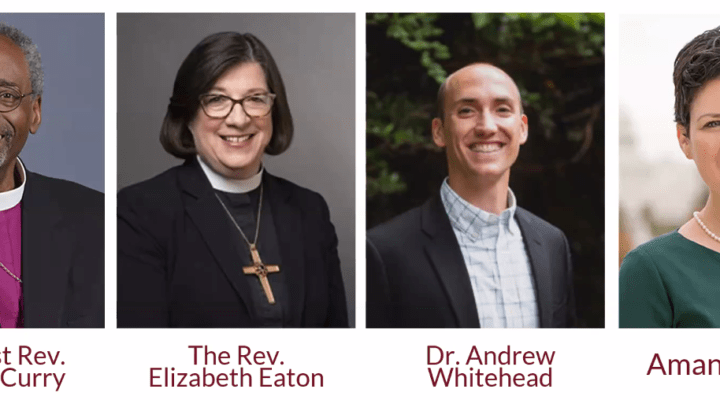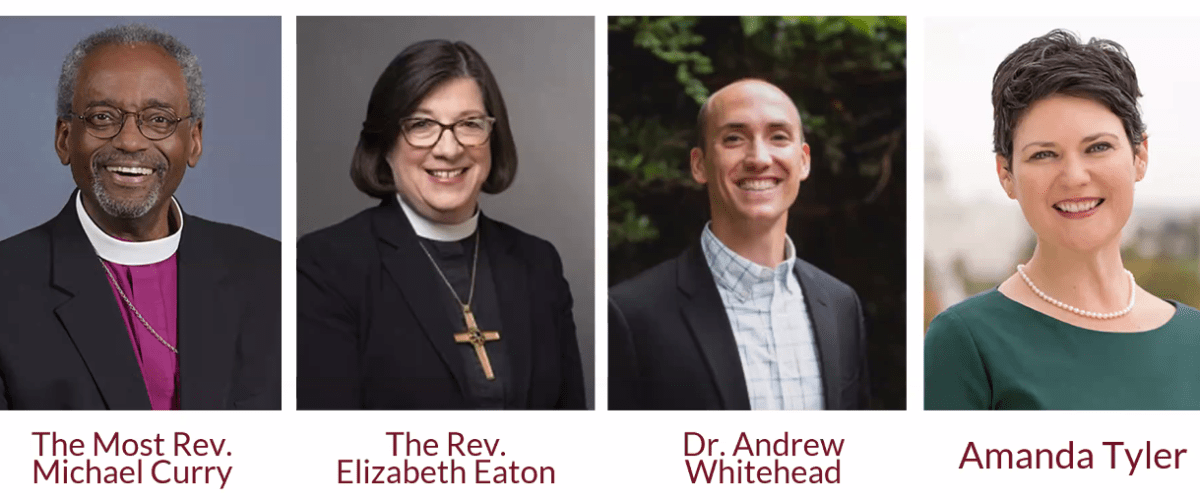Christian nationalism represents a severe and present danger to American democracy, according to religious leaders affiliated with the group Christians Against Christian Nationalism.
People of faith must educate themselves about the movement, positively engage its adherents and pursue lives modeled closely on the Jesus of the New Testament, speakers said during a Jan. 27 webinar. And they must comprehend the immensity of the threat of Christian nationalism, added panelist Michael Bruce Curry, presiding bishop and primate of the Episcopal Church.
Christian nationalism — a belief that America is a “Christian nation” and that conflates loyalty to country with loyalty to God — “borders on blasphemy and idolatry,” he declared. “That kind of nationalism is dangerous to civic health, dangerous to Christianity and dangerous to humanity.”
Curry was joined on the virtual panel by Elizabeth Eaton, presiding bishop of the Evangelical Lutheran Church in America, and Andrew Whitehead, a sociologist whose research focuses on the ways in which religion is formed by contemporary American culture. He also is co-author of the 2020 book, Taking America Back for God: Christian Nationalism in the United States.
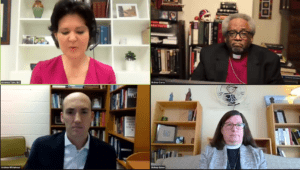 The hour-long webinar was moderated by Amanda Tyler, executive director of Baptist Joint Committee for Religious Liberty, which coordinates the Christians Against Christian Nationalism coalition.
The hour-long webinar was moderated by Amanda Tyler, executive director of Baptist Joint Committee for Religious Liberty, which coordinates the Christians Against Christian Nationalism coalition.
Dangers cited
Tyler opened the event with a warning about the dangers of Christian nationalism as a threat to religious freedom and to the separation of church and state as outlined in the U.S. Constitution. This belief system foments discrimination and violence and promotes legislation and governance shaped by blending of faith, nationalism and, in many cases, white supremacy, she asserted.
“Christians bear a special responsibility to understand and root out Christian nationalism,” Tyler said, adding later that “Christian nationalism threatens our faith and our democracy.”
Whitehead’s presentation sought to demonstrate just how real those threats are with a summary of sociological research showing that Christian nationalist attitudes cut across religious, ethnic, economic, educational and geographical lines.
“Cultural nationalism is a cultural framework that idealizes and advocates for fusion of Christianity with American civic life,” he said. “Christian nationalism is not new and it’s not going anywhere anytime soon.”
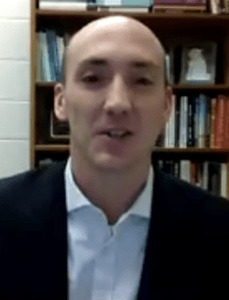
Andrew Whitehead
While civil religion pulls from Old Testament prophetic wisdom demanding public service and strong civic virtue, Christian nationalism uses biblical references to rationalize a fierce tribal, us-versus-them mentality in defending the group — violently, if deemed necessary, he said.
The nativist, white supremacist, patriarchal and militaristic assumptions embodied by the movement were on full display during the Jan. 6 storming of the U.S. Capitol by supporters of Donald Trump, Whitehead added.
A pervasive ideology today
The pervasiveness of religious nationalism is another of its dangers. While its support is greatest among evangelical Protestants, it also has adherents in Black, Catholic and mainline groups, with smaller numbers among Jews and those with no religious affiliation.
Sociological research clearly shows that Christian nationalism exists across geographical regions and education levels and is shaping attitudes toward democracy and toward the COVID-19 pandemic, he said. “It is absolutely a threat to a pluralistic, democratic society.”
Theologically flawed
Tyler asked the panelists to describe basic theological flaws of Christian nationalism.
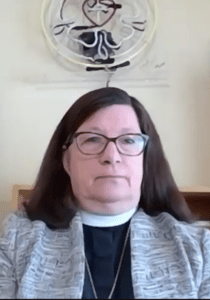
Bishop Elizabeth Eaton
The movement is broken at its core because it co-mingles faith and government, which is precisely the opposite of early Christians who “faced persecution because they gave their allegiance to the Lord, not to the state,” Eaton said. She added that it was a basic teaching of Martin Luther that Christians are citizens of the kingdom of God, not of temporal powers.
Curry said there is no room for Christian nationalism or other aberrant theologies for those who seek to follow the Jesus who preached the Sermon on the Mount and told the parable of the Good Samaritan.
Christian nationalism instead moves that Christ aside for an ambiguous one that serves its aspirations for power, he said, declaring that these impulses fueled American slavery, religious support for apartheid and the rationalizations of the Nazi church.
“Christ is Lord, not Caesar. When Christ is compromised, it’s, ‘Danger, Will Robinson.’”
Tied to white supremacy
Another flaw of Christian nationalism is its overlap with white supremacy, Curry said. “I have known since I was a child that the Klan professes to be Christian. We grew up knowing that it was an unholy conflation of Christianity and white supremacy.”
But this flaw also was evident in the nation’s founding, Eaton said. Religion was used to justify the racism and economic greed of white settlers as they took land from Native Americans. “White supremacy has been part of what this country is before it was a country.”
Noting that Jan. 27 was Holocaust Remembrance Day, Tyler asked why now is the time to speak out against Christian nationalism.
One reason is to prevent further violence inspired by the movement, Eaton said. The past four years have seen a rise in anti-Muslim bigotry and anti-Semitism in the United States, including the 2018 mass shooting at the Tree of Life synagogue in Pittsburgh, Pa., in which 11 Jews were killed and six wounded. “It is the largest slaughter of Jews in the United States of America,” she noted.
How to counter Christian nationalism
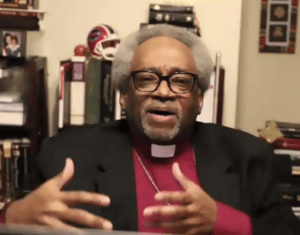
Bishop Michael Bruce Curry
To counter these “perversions of Christianity,” Christians must lead lives inspired by the Gospels, Curry said.
“Christianity must recenter itself on the teachings, the spirit and the example of Jesus of Nazareth. I mean the New Testament Jesus, the one in the book. Not the cultural one.”
Believers also must practice an “affirmative evangelism” that promotes a common humanity, he said. And they must reach out to people across race and religion to build relationships.
Whitehead said it’s also important to be educated about Christian nationalism. With more knowledge, Christians can advocate for minority groups and support legislation protective of Constitutional rights. “Christian nationalism, at its roots, is interested in power.”
Countering the movement also depends on knowing what a patriot is, Eaton said. “Christian nationalism is different from being a patriot. God knows I love my country, but my primary allegiance as a Christian is not to my country, but to my God.”
Tyler read a question from a viewer asking if it is possible to de-radicalize white supremacists and Christian nationalists.
Whitehead said that can’t be done through logical arguments or confronting adherents with facts. Rather, it requires engagement “focusing on emotions and relationships and building rapport with those people.”
And it’s important to remember that Christian nationalism is not a religion, but a cultural framework “that has a strong grip on the white Christian church in America,” Whitehead said. “I’m not saying Christians shouldn’t be patriotic or love their country. But Christian nationalism is a threat to the nation.”
Related articles:
Christian nationalism provides cover for white supremacy, BJC leader says
Who knew ‘unalienable rights’ could undermine life, liberty and true happiness? | opinion by Marv Knox
There are two Americas, and they are not on speaking terms | opinion by Alan Bean
Fundamentalists have a problem with Jesus | opinion by Mark Wingfield and Mitch Randall

